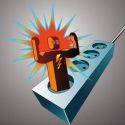Computerware Blog
Replace Your Weak Power Strip with UPS
Plugging computer hardware directly into a wall outlet (or even using a power strip) is a bad idea; this is because electricity moves in waves. These electrical waves cause power fluctuations. These fluctuations are usually too small for you to notice, although sometimes you can see the effects of the bigger fluctuations when the lights flicker. Big or small, it is the nature of a wave to cause deterioration to whatever it is constantly coming into contact with. Take sand pebbles as an example, they were made by waves.
These power fluctuations can be damaging to electrical equipment. Now granted, electricity waves are not going to turn your monitor into sand, and you can even plug everything into a wall socket and have it work, but without proper protection from power fluctuations, your computer's lifespan will be decreased.
Wall outlets and power strips will also fail to protect your hardware from the mother of all electrical waves, lightning. Without proper protection, a lightning strike can travel through your building's wiring and destroy every piece of equipment in its path. A bad situation like this will instantly zap you with thousands of dollars in damages, and if your company's data was not backed up, then the total loss to your business would be impossible to calculate.
A UPS device will even out the waves of electricity coming from your power lines and deliver a consistent flow of energy to your electronic equipment. This will help to extend the life of your mission critical computer equipment like your workstations, servers, and NAS devices. The basic idea behind the UPS is to use a battery or a flywheel to provide extra power during the low parts of the wave. A UPS also has filters that will prevent damage from the higher parts of the electrical waves.
The UPS will also provide a constant stream of power in the event of a power outage. A power outage that lasts even a few seconds will be very hard on your electrical equipment. In an event like a power outage, a UPS device has the clear advantage over power strips; this is because even the most expensive power strips cannot provide power. In fact, when your power goes out, it only takes 25 milliseconds for a UPS to switch to battery power and provide your device with electricity.
A UPS provides power, but it is different than a backup generator. There are many different models of UPS devices; on average, a UPS only provides a few minutes of power in the event of an outage. This should provide you with enough time to power down your equipment in case the power stays off. Many data centers hook up UPS devices to all of their servers; this allows data centers enough time to fire up backup generators so that no data will be lost in the event of a power outage.
Computerware can help you find a UPS device that is the perfect size for your business. We also offer backup solutions (BDR) for your company's data that will send your files to an offsite data center like the ones we mentioned. To learn more about UPS and BDR, call Computerware at (703) 821-8200.


Comments